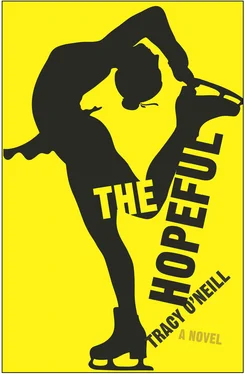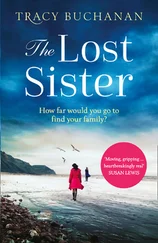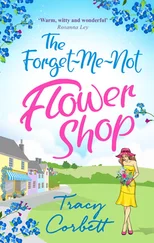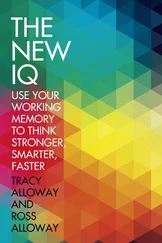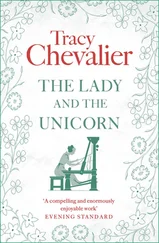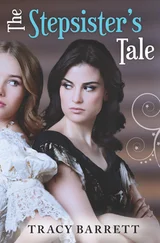I could think of a few reasons, none of which I wanted to admit. I stayed silent.
“Darling? Dearest? I hope you’ve not passed out at the prospect of your batty auntie coming to see you.”
“Still awake.”
“Well then, when is your next performance? When do I get to see the Sleeping Beauty wake?” The lie had not been premeditated. It had been born into my mind mysteriously, begotten not made as Jesus Christ, and now its death too was inscrutable. Lies, like dreams, propagated themselves ad infinitum. “Correct me if I’m wrong, but I do believe I recall a particular competition, the regionals? Is that soon?”
I thought of my last regionals, almost two years ago, when Sam had stood by Lauren at the boards and told me to skate a story. I glided to center ice and began with all the zeal of hunting potential. The jumps were the highest flights I’d ever reached in competition. There were gasps as I vaulted into a Russian split, and I felt the stupid hopeful glee of love glinting from my toe picks. But then somehow, somewhere after the dark rumble of the timpani drums, I lost momentum, or maybe the problem was I gained it. Anyway, on the double Axel, my left foot, what we in skating call my free foot, skimmed the ice as I landed. There was the first mistake and then another and another and gather myself as I might have hoped, I had gotten into a falling frenzy. Every jump from then on was as if I’d confused my butt for my foot. I flubbed a double Lutz, a jump I’d been doing almost two years, and thought: not again. In the end the audience clapped because they felt embarrassed for me. I left the rink without checking the scores. Later I’d learn that second-to-last place was the result of my year. The next day I was back at practice, more vigilant than ever. There was still then a next year.
Yet this was why the sport was perfect for deception: a skating year was only worth six minutes. Really only worth two and a half if one screwed up badly enough. The New England Regional Championships was the one qualifying competition for the Eastern Sectional Champions, which was the one qualifying competition for the National Championships. If I was actually competing this season and didn’t do well enough during the technical program portion of the competition, I wouldn’t be allowed to skate my long program. I wouldn’t even be permitted six minutes to not blow my year. You didn’t bother entering regionals if you didn’t feel capable of six minutes. The very structure of the sport was perfectly suited for a lie.
“I don’t want to present anything that isn’t perfect,” I said into the phone carefully. “And my technical program just isn’t ready, so I’m not competing this year, Aunt Miranda.”
“I’m sorry to hear that,” she said. “But you are still a star. I’ll look forward to the competition season next fall. Have a happy day, my pet. And please let me know when I can come see you, even if it’s just practice.”
“I will,” I said because I was a liar. It was just the beginning.
“Ali, can I speak with you?” Mark asked. He’d escaped my family and stood in the doorway. I hoped he’d not been listening to my conversation with Aunt Miranda. “This is your history,” he said. “Don’t you have anything to say?”
“What history?” I asked. Branches with branches had represented my classmates’ backgrounds in grade school when we made our family trees. Theirs were Irish and Polish and French-Canadian and French. But the tree I made was just me. When I turned in the aberration, my teacher said there were no families of one. But there were. I was ahistorical.
“You’re part of a tradition that you can’t ignore without imperialism winning,” Mark said.
“I’m not part of any tradition,” I said. “I was raised by white people.” This guy was persistent as a virus. It was what I liked best and least about him.
“The world sees your body, but you’re the only one who can see your mind, and you have to acknowledge your marked identity.” An identity marked by what except the loss of home though?
“I am my own Big Brother,” I said. “And I don’t care.”
Mark sighed. “Why not?”
“Because I don’t.” And really, I’d begun to think the only thing I cared about was curling up on a mattress and sleeping for a week. The air had lost its moisture. These pills weren’t doing anything. John Doe must have sold me bum speed, and now there was gravity in my shoulders, wrists, hips that spoke to me the only words that force ever said: give up.
“What about pride in your heritage?”
“The only time I was ever connected to that heritage was when I was attached by an umbilical cord.” He was really one to talk, considering he was the one skipping Thanksgiving dinner with his family to be with mine.
“But don’t you ever even wonder about your birth mother? Don’t you ever wonder if things might have been different? Don’t you want to see who you might turn out to be?”
“My mother is a stranger, and my mother told me to never talk to strangers,” I said. “And who I turn out: that would be me.” Of course this indifference wasn’t comprehensively true. Lately, I’d been dreaming of Fruit Loops and her thin Asian mother, hoping that all of the drugs and exercise weren’t in vain. I was racing against a body that could bloom any day, if it even had the horrible propensity for womanhood that I feared. My ignorance was a carapace of hope, but still it was heavy and creaking.
“Fine, but at least think about where we are. You must admit, at least, some connection to where you are now.” He began talking about the namesake of the town, Jeffrey Amherst, a man who committed biological warfare with diseased blankets until the natives were dead and their territory taken.
“Well we are unequal, Mark. We’re born unequal.”
“In a capitalist government, yes.”
“In general, yes. Some people are born more intelligent, more beautiful, stronger, quicker, taller. You went to Dartmouth. You’re smart and dogged. Some people will never be able to get into the Ivy League because they’ll never be able to remember that though Gatsby tried to be a self-made man, he ended up dead because he fell in love with the wrong woman: the woman of his dreams. Ability isn’t cheap.” I recalled Mark elaborating the green light when we’d read The Great Gatsby over the summer. Love, he’d said was proof of the fallacy of the American Dream. Rags to riches was one thing, like to love or love or to apathy? That was impossible to maneuver.
“You were listening. Sometimes I didn’t think you’d been listening.”
“Digression won’t get you anywhere with me.”
“I love it when you argue,” he said. “Even when you’re wrong.” I could see him searching my eyes and smiling, smiling and searching. “You know why I care about calling bullshit on Thanksgiving?” he said finally. “Because I’m a descendent of Amherst, and it’s like this thing Lenin said about the Revolution’s provisional government: ‘The utter falsity of all its promises should be made clear.’”
I was happy to think there were no debts of ancestry for me to repay. It seemed hard enough to earn your keep without a legacy of guilt. “You weren’t the colonizer, but what is this, anyway, Trivial Pursuit?”
“No, but did you know that Lenin kept a bullet wedged in his neck for four years during the Red Terror?” Mark’s eyes lit up with fun facts and fanaticism.
“I admire this Lenin,” I said.
“You know, there’s a benefit concert for the new communist candidate in a few weeks. I thought you might like to tag along.” This was abrupt, and Mark looked as surprised as I felt.
“Tag along?”
Читать дальше
